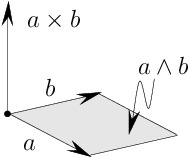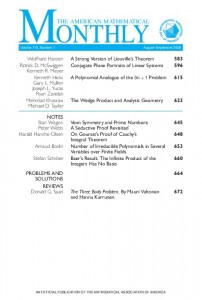The wedge product can be thought of as what the vector product ![]() of vector analysis should have been. If
of vector analysis should have been. If ![]() are the unit vectors along the three coordinate axes in 3-dimensional euclidean space and
are the unit vectors along the three coordinate axes in 3-dimensional euclidean space and
![]()
are two vectors, then the calculus student is told that
![Rendered by QuickLaTeX.com \[ a \times b \; = \; \det \left( \begin{matrix} \mathbf{i} & \mathbf{j} & \mathbf{k} \\ \lambda_1 & \lambda_2 & \lambda_3 \\ \xi_1 & \xi_2 & \xi_3 \end{matrix} \right) . \]](https://www.mdeetaylor.com/wp-content/ql-cache/quicklatex.com-0ed65bff011ee0d55c7c4b2aedf3c72a_l3.png)
This result, ![]() , is a vector perpendicular to both
, is a vector perpendicular to both ![]() and
and ![]() and oriented according to the “right-hand rule.”
and oriented according to the “right-hand rule.” 
Unfortunately for people who want to do more complicated things (for example, relativity theorists working in 4-dimensional space-time), the vector product only works — is indeed only defined — in three dimensions.
But the wedge product of vectors, ![]() , works in any dimension, and the vector product,
, works in any dimension, and the vector product, ![]() , can be thought of, in a certain sense, as a special case or modification of
, can be thought of, in a certain sense, as a special case or modification of ![]() . The trick is that if you form the wedge product
. The trick is that if you form the wedge product ![]() of vectors
of vectors ![]() in the
in the ![]() -dimensional euclidean space
-dimensional euclidean space ![]() , the result is not a vector in
, the result is not a vector in ![]() but rather a “vector” in a different vector space
but rather a “vector” in a different vector space ![]() .
.
To gain some feeling as to what this new “vector” is, recall that a vector ![]() in the plane or in 3-dimensional space is often thought of as a directed line segment. If
in the plane or in 3-dimensional space is often thought of as a directed line segment. If ![]() and
and ![]() are vectors in
are vectors in ![]() , then they determine a parallelogram having
, then they determine a parallelogram having ![]() and
and ![]() as its sides. We then identify
as its sides. We then identify ![]() with this parallelogram. More precisely, we identify it with an equivalence class of such parallelograms, and we also equip these parallelograms with a sort of “right-handedness” or “left-handedness,” what a mathematician likes to call an orientation.
with this parallelogram. More precisely, we identify it with an equivalence class of such parallelograms, and we also equip these parallelograms with a sort of “right-handedness” or “left-handedness,” what a mathematician likes to call an orientation.
The process can be extended. We can form “simple 3-vectors” ![]() which we can think of as “oriented” 3-dimensional parallelepipeds and then go on to even higher-dimensional “simple
which we can think of as “oriented” 3-dimensional parallelepipeds and then go on to even higher-dimensional “simple ![]() -vectors”
-vectors” ![]() . We can multiply them by scalars and add them and use them to do analytic geometry and calculus on curved surfaces in
. We can multiply them by scalars and add them and use them to do analytic geometry and calculus on curved surfaces in ![]() -dimensional euclidean space.
-dimensional euclidean space.
The reader who wants to know more is invited to click on The Wedge Product and Analytic Geometry and download a pdf file of the article which appeared in the August-September, 2008, issue of The American Mathematical Monthly.  This article, written by Mehrdad Khosravi and yours-truly, presumably has at least a modicum of value since it won a Lester R. Ford Award for exposition.
This article, written by Mehrdad Khosravi and yours-truly, presumably has at least a modicum of value since it won a Lester R. Ford Award for exposition.